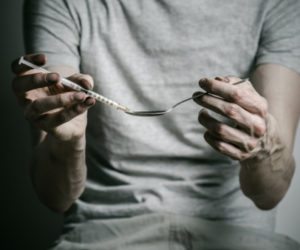Signs of Heroin Addiction – Learn the Symptoms & Facts

Understanding the symptoms and signs of heroin addiction
With escalating demands for heroin spurring a ripple of overdose deaths across the nation, learning the signs of heroin addiction could literally help to save someone’s life. According to estimates from the Centers for Disease Control and Prevention (CDC) heroin kills at least a hundred and twenty-five (125) Americans every day. Sadly, medical experts and law enforcement entities along with the families of those whose loved ones are afflicted with this debilitating condition, are particularly concerned about the fact that this trend is spiking rather than showing signs of abating.
Unfortunately, signs of heroin use often goes undetected until it is too late. In recent years, in particular; parents have become extremely concerned about heroin use among teenagers and young adults. This has been attributed in part to inattentiveness or ignorance about the signs of heroin addiction or a heroin addict’s behavior. Whether parents are paying attention or not, reactions to the negative effects of heroin abuse and addiction is being evidenced daily by emergency room medical staff. ER data reveal that a staggering number of teenagers and young adults are misusing this potent drug. Drug rehab centers have also reported a surge in the number of patients being treated for heroin abuse in this demographic.
Although the visible signs of heroin addiction are not that dissimilar to most other substances of abuse, there are some telling signs associated primarily with this drug.
Signs of Heroin Addiction
Addiction experts and other medical health professionals suggest that you seek help immediately if the following signs of heroin addiction is observed in yourself or a loved one:
- Recreational use of heroin has changed from occasional use to habitual or regular use.
- The need to use heroin has been gradually intensifying from the initial use period.
- Use of heroin has begun to affect the way you live your life relevant to school work, family interaction, work responsibility and your social life.
- You are mentally preoccupied with getting and using this drug. This is indicative of obsessive and compulsive patterns of behavior that meet the criteria for drug addiction as reported by the National Institute on Drug Abuse.
- You need heroin to make it through the day. If you feel the urge or have a craving to use heroin every single day and use affects how you spend your day, it may be time to seek professional help.
- You are spending more than you can afford to support your heroin habit.
- Use of heroin accompanies risky behavior such as skirting the law, poly drug use, sharing needles, promiscuous sex, driving or caring for young children while under the influence of heroin.
Heroin is a highly addictive substance that has been classified by the Drug Enforcement Administration as a Schedule I substance. Drugs with this designation poses the greatest threat for abuse, dependence and addiction. Recreational use of heroin can begin a downward spiral into a lifestyle fraught with medical and legal problems. Just one dose of a heroin blend can result in a fatal overdose.
In recent years, studies show heroin drugs deaths have skyrocketed in major urban cities and particularly in rural areas. In fact, heroin related deaths have more than tripled since 2010. Heroin laced with fentanyl, a powerful painkiller that scientist say is a hundred times more potent than heroin has also resulted in multiple overdose deaths for a number of unsuspecting heroin users.
Whether you are already in addiction or suspect that a loved one is using this drug, it is important to seek help immediately. Without immediate and appropriate medical intervention, people overdosing on heroin usually do not survive. Unfortunately, people already in addiction to heroin may not be unable to seek the help they need due to the effects of the drug. Addiction to heroin is recognized by the National Institute on Drug Abuse (NIDA) as a brain disease. Those exhibiting signs indicative of a dependence or heroin addict behavior usually engage in obsessive drug seeking and compulsive use despite the possibility for serious consequences.
If you suspect heroin has become a problem for yourself or for a friend or family member it is important to seek help immediately. There has been significant discoveries and breakthroughs for people battling this addiction. Heroin addiction treatment interventions include a range of pharmacological and behavioral therapies. These treatment modalities can also be augmented with alternative treatment remedies for a comprehensive continuum of care. As a result, drug rehabilitation for people with a dependence or addiction to heroin can therefore expect to engage in more cutting edge innovative treatment processes with a high success rate of achieving long term sobriety.
If you or a loved one needs help with abuse and/or treatment, please call the WhiteSands Treatment at (877) 855-3470. Our addiction specialists can assess your recovery needs and help you get the addiction treatment that provides the best chance for your long-term recovery.
